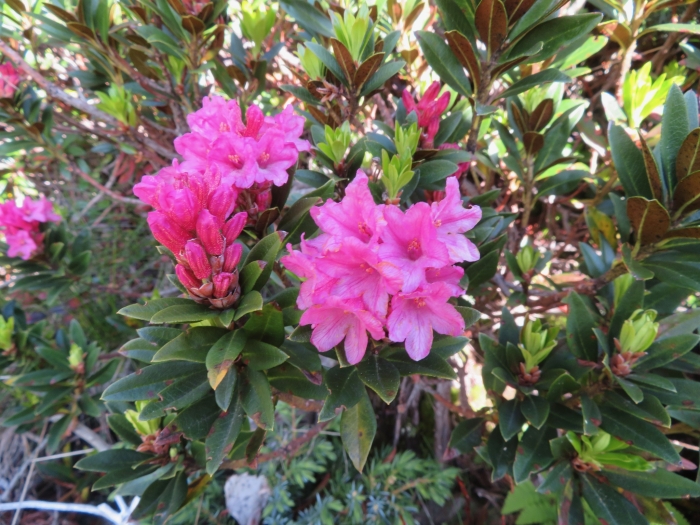Alpenrose
(Rhododendron ferrugineum)
Alpenrose (Rhododendron ferrugineum)
/
/

belvedere04
CC BY 4.0
Image By:
belvedere04
Recorded By:
Copyright:
CC BY 4.0
Copyright Notice:
Photo by: belvedere04 | License Type: CC BY 4.0 | License URL: http://creativecommons.org/licenses/by/4.0/ | Rights Holder: belvedere04 | Publisher: iNaturalist | Date Created: 2022-06-02T14:55:22-07:00 |

























Estimated Native Range
Summary
Rhododendron ferrugineum, commonly known as Alpenrose, is an evergreen shrub that typically grows up to 5 feet tall and wide. It is native to the mountainous regions of Europe, including the Alps, Pyrenees, Jura, and northern Apennines, where it thrives in subalpine and alpine zones. The Alpenrose prefers moist, acidic, siliceous soils and is often found in coniferous forests and shrubby areas, contributing to the unique ecology of these high-altitude habitats.
The Alpenrose is notable for its leathery, dark green leaves with rust-brown spots on the undersides and its clusters of showy, bell-shaped, pinkish-red flowers that bloom in late spring to early summer. The flowers are particularly attractive to pollinators such as bees. In cultivation, it is valued for its hardiness, evergreen foliage, and vibrant floral display. It is used in rock gardens, as foundation plantings, and in borders, especially in regions with cooler summer temperatures. Gardeners should provide Alpenrose with well-drained, acidic soil and ensure it receives regular moisture, especially during dry periods. It prefers part shade to full sun, with protection from harsh afternoon sun in warmer climates. While generally low-maintenance, it can be susceptible to pests such as vine weevils and diseases like root rot if conditions are too wet. It is also moderately toxic if ingested, so caution should be exercised where pets or children may have access.CC BY-SA 4.0
The Alpenrose is notable for its leathery, dark green leaves with rust-brown spots on the undersides and its clusters of showy, bell-shaped, pinkish-red flowers that bloom in late spring to early summer. The flowers are particularly attractive to pollinators such as bees. In cultivation, it is valued for its hardiness, evergreen foliage, and vibrant floral display. It is used in rock gardens, as foundation plantings, and in borders, especially in regions with cooler summer temperatures. Gardeners should provide Alpenrose with well-drained, acidic soil and ensure it receives regular moisture, especially during dry periods. It prefers part shade to full sun, with protection from harsh afternoon sun in warmer climates. While generally low-maintenance, it can be susceptible to pests such as vine weevils and diseases like root rot if conditions are too wet. It is also moderately toxic if ingested, so caution should be exercised where pets or children may have access.CC BY-SA 4.0
Plant Description
- Plant Type: Shrub
- Height: 2-4 feet
- Width: 2-4 feet
- Growth Rate: Slow
- Flower Color: Pink
- Flowering Season: Summer
- Leaf Retention: Evergreen
Growth Requirements
- Sun: Full Sun, Part Shade
- Water: Medium
- Drainage: Medium
Common Uses
Bank Stabilization, Bee Garden, Bird Garden, Border Plant, Butterfly Garden, Deer Resistant, Erosion Control, Fire Resistant, Low Maintenance, Rock Garden, Showy Flowers
Natural Habitat
Native to subalpine and alpine zones, coniferous forests, and shrubby areas in the mountainous regions of Europe
Other Names
Common Names: Rusty-leaved Alpenrose, Alpine-Rose, Rhododendron, Snow-rose
Scientific Names: , Rhododendron ferrugineum, Azalea ferruginea, Chamaerhododendron ferrugineum, Plinthochroma ferrugineum, Plinthocroma ferrugineum, Rhododendron ferrugineum f. albiflorum, Rhododendron ferrugineum f. albiflorum, Rhododendron ferrugineum f. album, Rhododendron ferrugineum f. atrococcineum
GBIF Accepted Name: